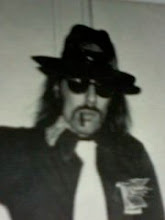In 1969, the vaunted music scene in San Francisco was descending to earth like so many purple orchids at a Moby Grape signing party. The Grateful Dead were in the process of getting ripped off by their manager, Country Joe & the Fish had lost their mojo, Janis Joplin had left Big Brother, Tracy Nelson of Mother Earth was having trouble "living with the animals," and the Grape's Skip Spence had taken a sabbatical in a mental hospital. Only the Jefferson Airplane still espoused the Timothy Leary ideal of acid and togetherness--and Leary was on his way to jail. Even John Fogerty of Creedence, whose year rivaled the Beatles, was complaining everyplace looked like "Lodi" to him. Ironically, as Steve Miller pronounced, for a music fan it was a great time to be "Living in the USA."
Wednesday, June 24, 2009
Thursday, June 4, 2009
By the Time We Got to Woodstock: Goin' up the Country
Here's a playlist taken from a chapter in By the Time We Got to Woodstock that I like to call "The Vegetable Theory."
1969 gave us a wholesale shift among the rock cognoscenti toward Country music. The simple answer as to why this happened was to blame it all on Bob Dylan, who scheduled a return trip to Nashville in February of 1969 for the recording of his first pure country album, Nashville Skyline. Although Dylan had been recording in Nashville since Blonde on Blonde in 1966, to the faithful this radical move to the music of the enemy (the right) could be explained by one thing and one thing only: he had clearly lost his mind in his 1966 motorcycle accident.
Nevertheless, thanks to Dylan and friends like the Byrds, the Band, and the Flying Burrito Brothers, a previously close-minded generation was opened up to some great songs and songwriters, including legends like Johnny Cash, Joe South and Kris Kristofferson. Hearing bluesy belter Tracy Nelson take on "That's All Right, Mama," with Elvis sideman Scotty Moore backing her on guitar, is alone worth the price of admission.
By the Time We Got to Woodstock: The L.A. Trip
Here's the next installment in my continuing series of segues derived from my forthcoming book: By the Time We Got to Woodstock: The Great Rock Revolution of 1969, coming in September from Backbeat Books.
As described by ex-New Yorker Carole King in "No Easy Way Down," the fall of Aquarius was experienced most directly in Los Angeles. While some singers personified the innocence of the era, like Neil Young in "Sugar Mountain" or Zappa protege Sandy Hurvitz, AKA Uncle Meat in "Arch Godliness of Purpleful Magic," closer to the truth was "Sin City" by the Flying Burrito Brothers. Joni Mitchell may have had a grand time, segueing from David Crosby to Graham Nash, but most everyone else was coming under an evil spell. None was more ensnared than the Beach Boys' Dennis Wilson, who entertained "the houseguest from hell," mass-murderer to be Charles Manson, and rewrote his tune "Never Learn Not to Love" to partly offset the cost of his extended visit.
Here's a trip back to those glorious days of Scorpio descending.
Here's a trip back to those glorious days of Scorpio descending.
Tuesday, May 26, 2009
By the Time We Got to Woodstock: Nixon's Coming
The following is the first Imix from my forthcoming book, By the Time We Got to Woodstock: The Great Rock Revolution of 1969 (Backbeat Books, September).
The period starting in Washington, D.C. right after the election of Richard M. Nixon on November 4, 1968, and concluding with four deaths at Kent State in Ohio at the hands of the National Guard on May 4, 1970, was a time in the annals of rock ’n’ roll like no other, in which hope grappled with despair, wisdom debated foolishness, belief and incredulity shared meals at the same communal table, and the forces of darkness escalated their counterassault on the light-bearing counterculture as dusk fell on Aquarius.
After the crushing defeats and confusions of 1968, 1969 would be a year of radical and profound personal risks, changes, and choices in the way music was perceived, written about, experienced, exploited, played, and disseminated, containing key releases by artists of unparalleled promise and uncommon achievement working in dozens of sometimes overlapping genres with ferocious pride born of rabid competition and massive stakes.
Subscribe to:
Comments (Atom)

